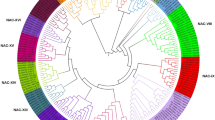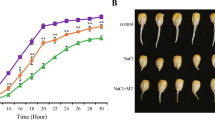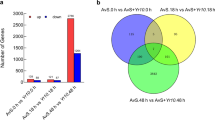Abstract
Soil salinization–alkalization is a major hindrance to agricultural development globally. Tea crabapple is widely used in China. However, little remains known regarding the molecular mechanisms used to withstand mixed saline–alkali stress (MSAS). Herein, we exposed tea crabapple seedlings to MSAS, and RNA-seq was performed for the transcriptome analysis of roots. Between 43.26 million and 43.37 million clean reads were thus obtained. In comparison with the control group (day 0), 2931, 2335, and 3746 genes were differentially expressed at day 1, day 3, and day 6 of MSAS exposure, respectively, and 1022 genes were common in the three comparison groups. On functional annotation, we observed that numerous differentially expressed genes were involved in “global and overview maps”; “carbohydrate metabolism”; “folding, sorting, and degradation”; “biosynthesis of other secondary metabolites”; “environmental adaptation”; and “signal transduction.” Heat shock proteins, cytochrome P450s, disease-resistant proteins, non-specific lipid-transfer proteins, pectate lyase, and beta-glucosidases were also induced in response to MSAS, in addition to nitrogen, phosphorus, and potassium absorption and metabolism-related genes. Transcription factor-coding genes appear to regulate the response of tea crabapple roots to MSAS by participating in, for example, plant hormone signal transduction and heat shock response. We also performed quantitative real-time PCR to validate the expression of six differentially expressed genes. Our findings provide new insights into the molecular mechanisms used by tea crabapple to cope with MSAS.







Similar content being viewed by others
References
Abbasi GH, Akhtar J, Ahmad R, Jamil M, Anwar-ul-Haq M, Ali S, Ijaz M (2015) Potassium application mitigates salt stress differentially at different growth stages in tolerant and sensitive maize hybrids. Plant Growth Regul 76:111–125. https://doi.org/10.1007/s10725-015-0050-1
Anastasiou E, Kenz S, Gerstung M, MacLean D, Timmer J, Fleck C, Lenhard M (2007) Control of plant organ size by KLUH/CYP78A5-dependent intercellular signaling. Dev Cell 13:843–856. https://doi.org/10.1016/j.devcel.2007.10.001
Chandel G, Dubey M, Meena R (2013) Differential expression of heat shock proteins and heat stress transcription factor genes in rice exposed to different levels of heat stress. J Plant Biochem Biotechnol 22:277–285. https://doi.org/10.1007/s13562-012-0156-8
Dai L, Yin K, Zhang Y, Yu C, Li M, Du J (2016) Screening and analysis of soda saline-alkali stress induced up- regulated genes in sugar sorghum. Maydica 61:9
Das P, Majumder AL (2019) Transcriptome analysis of grapevine under salinity and identification of key genes responsible for salt tolerance. Funct Integr Genomics 19:61–73. https://doi.org/10.1007/s10142-018-0628-6
Demi̇ral M (2017) Effect of salt stress on concentration of nitrogen and phosphorus in root and leaf of strawberry plant. EJSS 6:357–364. https://doi.org/10.18393/ejss.319198
FAOSTAT (2020) http://www.fao.org/faostat/en/#data/QC. Accessed 5 Nov 2020
Ge Y, Li Y, Zhu Y, Bai X, Lv DK, Guo D, Ji W, Cai H (2010) Global transcriptome profiling of wild soybean (Glycine soja) roots under NaHCO3 treatment. BMC Plant Biol 10:153. https://doi.org/10.1186/1471-2229-10-153
Hu W, Hu G, Han B (2009) Genome-wide survey and expression profiling of heat shock proteins and heat shock factors revealed overlapped and stress specific response under abiotic stresses in rice. Plant Sci 176:583–590. https://doi.org/10.1016/j.plantsci.2009.01.016
Ito T, Meyerowitz EM (2000) Overexpression of a gene encoding a cytochrome P450, CYP78A9, induces large and seedless fruit in Arabidopsis. Plant Cell 12:1541–1550. https://doi.org/10.1105/tpc.12.9.1541
Jia X, Wang H, Svetla S, Zhu Y, Hu Y, Cheng L, Zhao T, Wang Y (2019) Comparative physiological responses and adaptive strategies of apple Malus halliana to salt, alkali and saline-alkali stress. Sci Hortic 245:154–162. https://doi.org/10.1016/j.scienta.2018.10.017
Jiang C, Xu J, Zhang H, Zhang X, Shi J, Li M, Ming F (2009) A cytosolic class I small heat shock protein, RcHSP17. 8, of Rosa chinensis confers resistance to a variety of stresses to Escherichia coli, yeast and Arabidopsis thaliana. Plant Cell Environ 32:1046–1059. https://doi.org/10.1111/j.1365-3040.2009.01987.x
Jin H, Kim HR, Plaha P, Liu SK, Park JY, Piao YZ, Yang ZH, Jiang GB, Kwak SS, An G, Son M, Jin YH, Sohn JH, Lim YP (2008) Expression profiling of the genes induced by Na2CO3 and NaCl stresses in leaves and roots of Leymus chinensis. Plant Sci 175:784–792. https://doi.org/10.1016/j.plantsci.2008.07.016
Jung S, Lee T, Cheng CH, Buble K, Zheng P, Yu J, Humann J, Ficklin SP, Gasic K, Scott K, Frank M, Ru S, Hough H, Evans K, Peace C, Olmstead M, DeVetter LW, McFerson J, Coe M, Wegrzyn JL, Staton ME, Abbott AG, Main D (2019) 15 years of GDR: new data and functionality in the Genome Database for Rosaceae. Nucleic Acids Res 47:D1137–D1145. https://doi.org/10.1093/nar/gky1000
Khan SA, Li MZ, Wang SM, Yin HJ (2018) Revisiting the role of plant transcription factors in the battle against abiotic stress. Int J Mol Sci 19:1634. https://doi.org/10.3390/ijms19061634
Khanom S, Jang J, Lee OR (2019) Overexpression of ginseng cytochrome P450 CYP736A12 alters plant growth and confers phenylurea herbicide tolerance in Arabidopsis. J Ginseng Res 43:645–653. https://doi.org/10.1016/j.jgr.2019.04.005
Langmead B, Trapnell C, Pop M, Salzberg SL (2009) Ultrafast and memory-efficient alignment of short DNA sequences to the human genome. Genome Biol 10:R25. https://doi.org/10.1186/gb-2009-10-3-r25
Li B, Fan R, Guo S, Wang P, Zhu X, Fan Y, Chen Y, He K, Kumar A, Shi J (2019) The Arabidopsis MYB transcription factor, MYB111 modulates salt responses by regulating flavonoid biosynthesis. Environ Exp Bot 166:103807. https://doi.org/10.1016/j.envexpbot.2019.103807
Li J, Liu H, Yang C, Wang J, Yan G, Si P, Bai Q, Lu Z, Zhou W, Xu L (2020) Genome-wide identification of MYB genes and expression analysis under different biotic and abiotic stresses in Helianthus annuus L. Ind Crops Prod 143:111924. https://doi.org/10.1016/j.indcrop.2019.111924
Liu Y, Du M, Deng L, Shen J, Fang M, Chen Q, Lu Y, Wang Q, Li C, Zhai Q (2019) MYC2 Regulates the termination of jasmonate signaling via an autoregulatory negative feedback loop. Plant Cell 31:106–127. https://doi.org/10.1105/tpc.18.00405
Miura K (2013) Nitrogen and phosphorus nutrition under salinity stress. In: Ahmad P, Azooz M, Prasad M (ed) Ecophysiology and responses of plants under salt stress. Springer, New York, pp 425–441. https://doi.org/10.1007/978-1-4614-4747-4_16
Opassiri R, Ketudat J, Cairns R, Akiyama T, Wara-Aswapati O, Savasti J, Esen A (2003) Characterization of a rice β-glucosidase highly expressed in flower and germinating shoot. Plant Sci 165:627–638. https://doi.org/10.1016/S0168-9452(03)00235-8
Qi X, Liu C, Song L, Li Y, Li M (2017) PaCYP78A9, a Cytochrome P450, regulates fruit size in sweet cherry (Prunus avium L.). Front Plant Sci 8:2076. https://doi.org/10.3389/fpls.2017.02076
Riechmann JL, Heard J, Martin G, Reuber L, Jiang C-Z, Keddie J, Adam L, Pineda O, Ratcliffe OJ, Samaha RR, Creelman R, Pilgrim M, Broun P, Zhang JZ, Ghandehari D, Sherman BK, Yu G-L (2000) Arabidopsis transcription factors: genome-wide comparative analysis among eukaryotes. Science 290:2105–2110. https://doi.org/10.1126/science.290.5499.2105
Sabatino L, Iapichino G, D’Anna F, Eristanna P, Giuseppe M, Giuseppe LR (2018) Hybrids and allied species as potential rootstocks for eggplant: effect of grafting on vigour, yield and overall fruit quality traits. Sci Hortic 228:81–90. https://doi.org/10.1016/j.scienta.2017.10.020
Shi D, Wang D (2005) Effects of various salt-alkaline mixed stresses on Aneurolepidium chinense (Trin.) Kitag. Plant Soil 271:15–26. https://doi.org/10.1007/s11104-004-1307-z
Singh K, Foley RC, Oñate-Sánchez L (2002) Transcription factors in plant defense and stress responses. Curr Opin Plant Biol 5:430–436. https://doi.org/10.1016/s1369-5266(02)00289-3
The Gene Ontology Consortium (2019) The Gene Ontology Resource: 20 years and still GOing strong. Nucleic Acids Res 47:D330–D338. https://doi.org/10.1093/nar/gky1055
Vera-Sirera F, Gomez MD, Perez-Amador MA (2016) DELLA proteins, a group of GRAS transcription regulators that mediate gibberellin signaling. In Gonzalez DH (ed) Plant transcription factors. Academic Press, Boston, pp 313–328. https://doi.org/10.1016/B978-0-12-800854-6.00020-8
Wang C, Gao C, Wang L, Zheng L, Yang C, Wang Y (2014) Comprehensive transcriptional profiling of NaHCO3-stressed Tamarix hispida roots reveals networks of responsive genes. Plant Mol Biol 84:145–157. https://doi.org/10.1007/s11103-013-0124-2
Wang YX, Hu Y, Zhu YF, Baloch AW, Jia XM, Guo AX (2018) Transcriptional and physiological analyses of short-term iron deficiency response in apple seedlings provide insight into the regulation involved in photosynthesis. BMC Genomics 19:461–472. https://doi.org/10.1186/s12864-018-4846-z
Wu B, Hu Y, Huo P, Zhang Q, Chen X, Zhang Z (2017) Transcriptome analysis of hexaploid hulless oat in response to salinity stress. PLoS ONE 12:e0171451. https://doi.org/10.1371/journal.pone.0171451
Xie M, Chen H, Huang L, O’Neil RC, Shokhirev MN, Ecker JR (2018) A B-ARR-mediated cytokinin transcriptional network directs hormone cross-regulation and shoot development. Nat Commun 9:1604. https://doi.org/10.1038/s41467-018-03921-6
Xu J, Wang XY, Guo WZ (2015) The cytochrome P450 superfamily: key players in plant development and defense. J Integr Agric 14:1673–1686. https://doi.org/10.1016/S2095-3119(14)60980-1
Xu M, Zeng CB, He R, Yan Z, Qi Z, Xiong R, Cheng Y, Wei SS, Tang H (2019) Transcriptome analysis of banana (Musa acuminate L.) in response to low-potassium stress. Agronomy 9: 169. https://doi.org/10.3390/agronomy9040169
Xu N, Liu S, Lu Z, Pang S, Wang L, Wang L, Li W (2020) Gene expression profiles and flavonoid accumulation during salt stress in Ginkgo biloba seedlings. Plants 9:1162. https://doi.org/10.3390/plants9091162
Yang JY, Zheng W, Tian Y, Wu Y, Zhou DW (2011) Effects of various mixed salt-alkaline stresses on growth, photosynthesis, and photosynthetic pigment concentrations of Medicago ruthenica seedlings. Photosynthetica 49:275–284. https://doi.org/10.1007/s11099-011-0037-8
Ye X, Wang H, Cao X, Jin X, Cui F, Bu Y, Liu H, Wu W, Takano T, Liu S (2019) Transcriptome profiling of Puccinellia tenuiflora during seed germination under a long-term saline-alkali stress. BMC Genomics 20:589. https://doi.org/10.1186/s12864-019-5860-5
Zhang M, Hong L, Gu M, Wu C-D, Zhang G (2020) Transcriptome analyses revealed molecular responses of Cynanchum auriculatum leaves to saline stress. Sci Rep 10:449. https://doi.org/10.1038/s41598-019-57219-8
Zhu Y, Wu Y, Hu Y, Jia X, Zhao T, Cheng L, Wang Y (2019) Tolerance of two apple rootstocks to short-term salt stress: Focus on chlorophyll degradation, photosynthesis, hormone and leaf ultrastructures. Acta Physiol Plant 41:87. https://doi.org/10.1007/s11738-019-2877-y
Author information
Authors and Affiliations
Corresponding author
Ethics declarations
Conflict of Interest
The authors declare no competing interests.
Additional information
Publisher's Note
Springer Nature remains neutral with regard to jurisdictional claims in published maps and institutional affiliations.
Key Messages
• We studied the response of tea crabapple roots to mixed saline–alkali stress (MSAS).
• One thousand twenty-two overlapping DEGs were identified across three comparison groups.
• Genes encoding various transcription factors significantly responded to MSAS.
• Genes associated with nitrogen, phosphorus, and potassium metabolism regulation facilitate tolerance to MSAS.
Supplementary Information
Below is the link to the electronic supplementary material.
Rights and permissions
Springer Nature or its licensor holds exclusive rights to this article under a publishing agreement with the author(s) or other rightsholder(s); author self-archiving of the accepted manuscript version of this article is solely governed by the terms of such publishing agreement and applicable law.
About this article
Cite this article
Wang, XL., Peng, L., Wang, J. et al. Comprehensive Transcriptome Analysis of Tea Crabapple (Malus hupehensis Rehd.) Roots Subjected to Mixed Saline–Alkali Stress. Plant Mol Biol Rep 41, 27–45 (2023). https://doi.org/10.1007/s11105-022-01353-7
Received:
Accepted:
Published:
Issue Date:
DOI: https://doi.org/10.1007/s11105-022-01353-7




